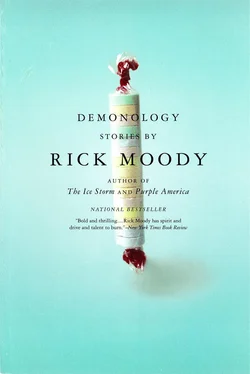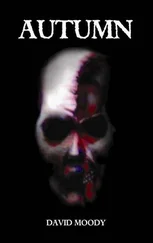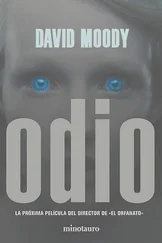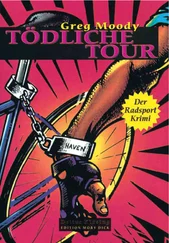I walked through all these ceremonies, Sis, before I could bring myself to go over to the Rip Van Winkle Room. My steps were reluctant. My observations: the proportions of sniffling at each ceremony were about equal and the audiences were about equal and levels of whimsy and seriousness were about the same wherever you went. The emotions careened, high and low, across the whole spectrum of possible feelings. The music might be different from case to case — stately baroque anthems or klezmer rave-ups — but the intent was the same. By 3:00 P.M., I no longer knew what marriage meant, really, except that the celebration of it seemed built into every life I knew but my own.
The doors of the Rip Van Winkle Room were open, as distinct from the other suites, and I tiptoed through them and closed these great carved doors behind myself. I slipped into the brides side. The light was dim, Sis. The light was deep in the ultraviolet spectrum, as when we used to go, as kids, to the exhibitions at the Hall of Science and Industry. There seemed to be some kind of mummery, some kind of expressive dance, taking place at the altar. The Champlain Pentecostal Singers were wailing eerily. As I searched the room for familiar faces, I noticed them everywhere. Just a couple of rows away Alex McKinnon and her boy Zack were squished into a row and were fidgeting desperately. Had they known Brice? Had they known you? Maybe they counted themselves close friends of Sarah Wilton. Zack actually turned and waved and seemed to mouth something to me, but I couldn’t make it out. On the groom’s side, I saw Linda Pietrzsyk, though she ought to have been working in the office, fielding calls, and she was surrounded by Cheese, Chip, Mick, Mark, Stig, Blair and a half-dozen other delinquents from her peer group. Like some collective organism of mirth and irony, they convulsed over the proceedings, over the scarlet tights and boas and dance belts of the modern dancers capering at the altar. A row beyond these Skid-more halfwits — though she never sat in at the ceremony — was Glenda Manzini herself, and she seemed to be sobbing uncontrollably, a handkerchief like a veil across her face. Where was her husband? And her boy? Then, to my amazement, Sis, when I looked back at the S.R.O. audience beyond the last aisle over on the groom’s side, Isaw Mom and Dad. What were they doing there? And how had they known? I had done everything to keep the wedding from them. I had hoarded these bad feelings. Dads face was gray with remorse, as though he could have done something to stop the proceedings, and Mom held tight to his side, wearing dark glasses of a perfect opacity. At once, I got up from the row where I’d parked myself and climbed over the exasperated families seated next to me, jostling their knees. As I went, I became aware of Brice McCann’s soft, insinuating voice ricocheting, in Dolby Surround Sound, from one wall of the Rip Van Winkle Room to the next. The room was appropriately named, it seemed to me then. We were all sleepers who dreamed a reverie of marriage, not one of us had waked to see the bondage, the violence, the excess of its cabalistic prayers and rituals. Marriage was oneiric. Not one of us was willing to pronounce the truth of its dream language of slavery and submission and transmission of property, and Brice’s vow, to have and to hold Sarah Wilton,till death did them part, forsaking all others, seemed to me like the pitch of a used-car dealer or insurance salesman, and these words rang out in the room, likewise Sarah’s uncertain and breathy reply, and I rushed at the center aisle, pushing away cretinous guests and cherubic newborns toward my parents, to embrace them as these words fell, these words with their intimations of mortality, to tell my parents I should never have let you drive that night, Sis. How could I have let you drive? How could I have been so stupid? My tires were bald — I couldn’t afford better. My car was a death trap; and I was its proper driver, bent on my long, complicated program of failure, my program of futures abandoned, of half-baked ideas, of big plans that came to nought, of cheap talk and lies, of drinking binges, petty theft; my car was made for my own death, Sis, the inevitable and welcome end to the kind of shame and regret I had brought upon everyone close to me, you especially, who must have wept inwardly, in your bosom, when you felt compelled to ask me to read a poem on your special day, before you totaled my car, on that curve, running up over the berm, shrieking, flipping the vehicle, skidding thirty feet on the roof, hitting the granite outcropping there, plunging out of the seat (why no seat belt?), snapping your neck, ejecting through the windshield, catching part of yourself there, tumbling over the hood, breaking both legs, puncturing your lung, losing an eye, shattering your wrist, bleeding, coming to rest at last in a pile of moldering leaves, where rain fell upon you, until, unconscious, you died.
Yet, as I called out to Mom and Dad, the McCann-Wilton wedding party suddenly scattered, the vows were through, the music was overwhelming, the bride and groom were married; there were Celtic pipes, and voices all in harmony — it was a dirge, it was a jig, it was a chant of religious ecstasy — and I couldn’t tell what was wedding and what was funeral, whether there was an end to one and a beginning to the other, and there were shouts of joy and confetti in the air, and beating of breasts and the procession of pink-cheeked teenagers, two by two, all living the dream of American marriages with cars and children and small businesses and pension plans and social-security checks and grandchildren, and I couldn’t get close to my parents in the throng; in fact, I couldn’t be sure if it had been them standing there at all, in that fantastic crowd, that crowd of dreams, and I realized I was alone at Brice McCann’s wedding, alone among people who would have been just as happy not to have me there, as I had often been alone, even in fondest company, even among those who cared for me. I should have stayed home and watched television.
This didn’t stop me, though. I made my way to the reception. I shoveled down the chicken satay and shrimp with green curry, along with the proud families of Sarah Wilton and Brice McCann. Linda Pietrzsyk appeared by my side, as when we had kissed in the Ticonderoga Suite. She asked if I was feeling all right.
— Sure, I said.
— Don’t you think I should drive you home?
— There’s someone I want to talk to, I said. — Then I’d be happy to go.
And Linda asked:
— What’s in the bag?
She was referring to my Wal-Mart shopping bag, Sis. I think the Wal-Mart policy which asserts that employees are not to let a customer pass without asking if this customerneeds help is incredibly enlightened. I think the way to a devoted customer is through his or her dignity. In the shopping bag, I was carrying the wedding gift I had brought for Brice McCann and Sarah Wilton. I didn’t know if I should reveal this gift to Linda, because I didn’t know if she would understand, but I told her anyhow. Is this what it’s like to discover, all at once, that you are sharing your life?
— Oh, that’s some of my sister.
— Andrew, Linda said, and then she apparently didn’t know how to continue. Her voice, in a pair of false starts, oscillated with worry. Her smile was grim. — Maybe this would be a good time to leave.
But I didn’t leave, Sis. I brought out the most dangerous weapon in my arsenal, the pinnacle of my nefarious plans for this event, also stored in my Wal-Mart bag. The Chicken Mask. That’s right, Sis. I had been saving it ever since my days at Hot Bird, and as Brice had yet to understand that I had crashed his wedding for a specific reason, I slipped this mask over my neatly parted hair, and over the collar of the wash-and-wear suit that I had bought that week for this occasion. I must say, in the mirrored reception area in the Rip Van Winkle Room, I was one elegant chicken. I immediately began to search the premises for the groom, and it was difficult to find him at first, since there were any number of like-minded beret-wearing motivational speakers slouching against pillars and counters. At last, though, I espied him preening in the middle of a small group of maidens, over by the electric fountain we had installed for the ceremony. He was laughing good-naturedly. When he first saw me, in the Chicken Mask, working my way toward him, I’m sure he saw me as an omen for his new union. Terrific! We’ve got achicken at the ceremony! Poultry is always reassuring at wedding time! Linda was trailing me across the room. Trying to distract me. I had to be short with her. I told her to go find herself a husband.
Читать дальше












